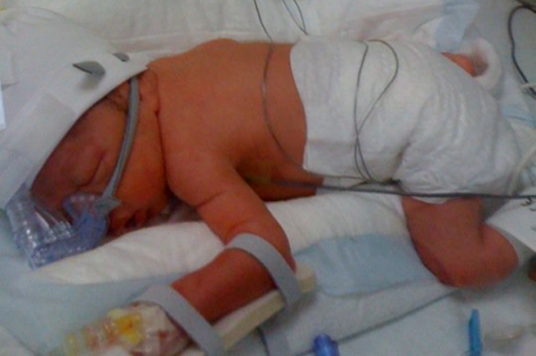Mothers share their appreciation for donated breast milk this World Milk Donation Day
St George’s Hospital in Tooting hosts a human milk bank on the neonatal unit, generously supported by Neonatal Unit charity, First Touch.
Human breast milk is collected, pasteurised and distributed to St George’s, Kingston and Croydon Hospitals, thanks to generous donors who make this work possible.
Naomi gave birth to Sebastian 8 weeks early, he spent 4 weeks in St George’s Special Care Baby Unit. Naomi shared:
“I was always adamant I wanted to breast feed and with Sebastian being early I was faced with this potentially not being possible. The race was on for me to start expressing, 2 weeks in I was expressing so much that I was running out of room in the hospital fridge to store the milk.
“It was so wonderful to be able to donate this to the Milk Bank to help others, I was glad to be able to give something back.”
Thursday 19th May is World Milk Donation Day, marking the importance of human milk donation to non-profit milk banks for the care of sick and early babies.
Breast milk is especially important for premature and sick babies, it contains a complete spectrum of nutrients and immune-system compounds. Giving premature babies breast milk helps their brain development and protects them against infections.
The reality of having a tiny and sick baby can impact on a mother’s ability to express milk. Donated breast milk from St George’s milk bank saves the lives of babies whose mothers cannot provide.
Lizzie gave birth to baby Edward at St George’s at 23 weeks and 6 days. She said:
“Not only did I never expect to have an extremely premature baby, but it had never occurred to me that I wouldn’t be able to breastfeed.
“When I heard about St George’s NNU milk bank, I was absolutely amazed that the service existed; that some mothers can produce so much milk for their babies that they had lots to spare; and that they were generous enough to donate it for Edward.”
Seema gave birth to Ravi and Rayan at 25 weeks and relied on donor milk for the first few days of their life. Seema said:
“Although my milk arrived at day 3, I was so relieved and grateful that my boys could have precious breast milk that I was unable to provide.
“Sadly, we lost Ravi at 11 days of age. My body didn’t get the memo and I was expressing so much milk that I soon filled up the hospital freezer and my own freezer at home. At that point I was offered the option to donate my milk.
“It was a simple process with a blood test and instructions for how to freeze the milk. Following Rayan’s discharge home, I continued to support the Human Milk Bank and I managed to donate 100 litres of milk!”
“I felt pride and comfort in knowing that although Ravi’s life had been brief, I was able to help other babies who had been in a similar situation to my boys.”
Anna gave birth to twins Ellie and Katie at 28 weeks days. She shared:
“I very quickly realised I had a good milk supply and that I’d soon have too much milk, so I made enquiries about donating.
“Although regular expressing seemed hard at times, especially when the alarm went off in the middle of the night, the thought of providing milk for my own and other babies made it all the worthwhile!!
Alexia donated several hundreds of litres of milk across her feeding journey after having baby Henrietta, she shared:
‘I donated across multiple hospitals, including St George’s and Southampton.
“I was able to donate several hundred litres of milk across my feeding journey, and my children had months of enjoying the excitement of the collection teams zooming up and down our road on their motorbikes!
“I was so pleased to be able to do my bit to help those facing the lonely and emotional NICU journey.”
Donating breast milk is incredibly rewarding, and easy.
If you’d like to find out about becoming a donor for the St George’s Milk Bank take a look at First Touch, or email milk.bank@nhs.net with your name, contact number, and the age of your baby.
Notes to editors
St George’s University Hospitals NHS FT
St George’s University Hospitals NHS Foundation Trust is the largest healthcare provider, major teaching hospital and tertiary centre for south west London, Surrey and beyond – and one of the largest healthcare providers in the UK – serving a population of 3.5 million.
Its main site, St George’s Hospital – one of the country’s principal teaching hospitals – is shared with St George’s, University of London, which trains medical students and carries out advanced medical research.
St George’s is one of 11 adult and children major trauma centres in the UK, one of eight hyper acute stroke units and one of the biggest and busiest of the eight heart attack centres in London.
It is also an accredited centre of excellence for trauma, neurology, cardiology, cancer and blood pressure services and is the national centre for family HIV care and bone marrow transplantation for non-cancer diseases.
St George’s children’s services are rated outstanding by the CQC.
St George’s is the only hospital site in London where children with cancer can receive oncology surgery, PICU and neurosurgery as well as oncology care all on the same site with the other specialties that are required as well.
Of the 16 specialisms in paediatrics, St George’s offers all but three.
Every year St George’s treats over 130,000 children and deliver 5000 babies.


